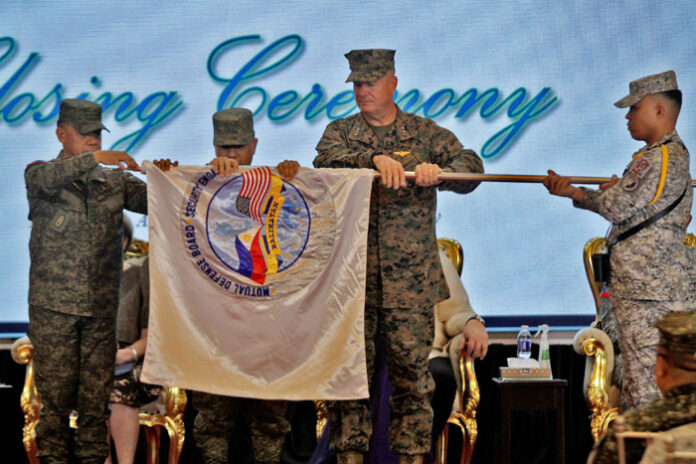This year’s Philippines-United States “Balikatan” exercises showcased the latest warfighting technologies available to both participants, underscoring the need to use modern tools for deterring aggressive nations.
“I’m very impressed with the deterrent effect of these exercises because even before the live fire exercise, Miguel Malvar wouldn’t have wanted to have felt the combined efforts of our forces and taken a leave beforehand,” Defense Secretary Gilberto Teodoro said at the closing ceremony held in Camp Aguinaldo.
He pointed out that the country needs to be resilient despite forces “whose perceptions of what good faith is may differ from ours.”
“Strong fences make for good neighbors,” he added.
The Balikatan’s 40th iteration highlighted the interoperability of both nations in mounting advanced cyber defense as well as integrated air and missile systems deployment.
For his part, Armed Forces of the Philippines (AFP) chief General Romeo Brawner lauded how participants in the wargames are able to collaborate, whether in live fire operations, cyber defense, maritime security activities, or humanitarian assistance efforts.
“It embodies our collective readiness to act in unison, underscoring that our greatest strength lies in unity. Moreover, this exercise reaffirms our dedication to peace, stability, and resilience across the Indo-Pacific region,” he added.
From April 24-29, the Multilateral Maritime Event (MME) brought together Philippine and U.S. naval forces to enhance cooperation in the nation’s strategic waters.
Activities spanned Subic Bay to Northern Luzon, emphasizing maritime domain awareness and operational coordination in archipelagic defense.
Also, cybersecurity took center stage with the Cyber Defense Exercise (CYDEX), running from April 21 to May 9.
The activity, observed by international partners including representatives from Japan, Canada, and Colombia, focused on simulating real-world cyber incidents and crafting unified responses.
Participants tackled complex scenarios to protect critical infrastructure, fostering trust and technological prowess among allied nations.
“This exercise is a key component of this year’s Balikatan, designed to strengthen mutual cyber defense capabilities and enhance interoperability in responding to evolving digital challenges.” the AFP chief said.
On April 27, the Integrated Air and Missile Defense (IAMD) exercise in Zambales showcased collaborative efforts to detect and counter aerial threats.
Using systems like the Philippine Air Force’s Spyder Air Defense and the U.S. Marine Air Defense Integrated System (MADIS), troops demonstrated seamless integration of ground and air assets.
The United States Marine Corps’ deployment of the Navy-Marine Expeditionary Ship Interdiction System (NMESIS) marked a technological milestone on April 26.
Deployed during the Maritime Key Terrain Security Operations (MKTSO) in Northern Luzon, the NMESIS offers a land-based solution to deter naval threats.
This system significantly enhances the joint forces’ ability to secure critical maritime regions and project sea denial capabilities.
Meanwhile, Teodoro said he anticipates increased aggression from Chinese maritime forces toward Filipino naval patrols in the West Philippine Sea, particularly around Scarborough Shoal (Bajo de Masinloc).
“We have to expect more of the same,” he said in an ambush interview.
His statement follows the May 5 incident, where Chinese frigates and coast guard vessels engaged in what were described as “aggressive and unsafe” maneuvers against the Philippine Navy’s offshore patrol vessel, BRP Emilio Jacinto (PS-35). The Philippine ship was conducting a routine maritime patrol approximately 11.8 nautical miles southeast of Bajo de Masinloc at the time.
Despite these provocations, Teodoro reaffirmed that the Philippines remains steadfast in defending its territory, emphasizing that Filipino naval forces will continue their patrols in the area.
“Are they the ones dictating laws to the entire world?” Teodoro asked pointedly.
Earlier, National Security Adviser Eduardo Año echoed these concerns, noting that tensions in the South China Sea are unlikely to ease soon. Año attributed the ongoing challenges to China’s unfounded territorial claims, militarization, and confrontational behavior toward neighboring nations, all of which, he said, cannot be ignored.









